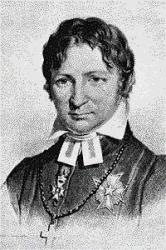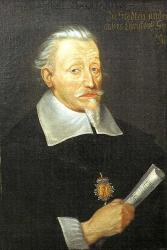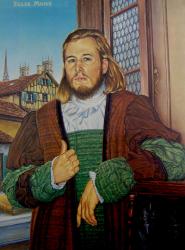1806 - 1874 Meter: 7.6.7.6.8.7.6 Translator of "O Lord, When My Sins Grieve Me" in The Cyber Hymnal Arthur Tozer Russell was born at Northampton, March 20, 1806. He entered S. John's College, Cambridge, in 1824, took the Hulsean Prize in 1825, and was afterwards elected to a scholarship. He was ordained Deacon in 1829, Priest in 1830, and the same year was appointed Vicar of Caxton. In 1852, he was preferred to the vicarage of Whaddon. In 1863, he removed to S. Thomas', Toxteth Park, near Liverpool, and in 1867, to Holy Trinity, Wellington, Salop. He is the editor and author of numerous publications, among them several volumes of hymns.
--Annotations of the Hymnal, Charles Hutchins, 1872.
=================================
Russell, Arthur Tozer , M.A. He was the son of the Rev. Thomas Clout, who later changed his surname for Russell (Gentlemen’s Magazine, 1848), an Independent or Congregational minister who won for himself a good reputation by editing the works of Tyndale, Frith, Barnes, and Dr. John Owen, &c. He was born at Northampton, March 20, 1806; educated at St. Saviour's School, Southwark, and at the Merchant Taylors' School, London. In 1822-24 he was at Manchester College, York. In 1825 he entered St. John's College, Cambridge, as a sizar, and in his freshman year gained the Hulsean Prize, its subject being, "In what respects the Law is a Schoolmaster to bring men to Christ." In 1829 he was ordained by the Bishop of Lincoln (Kaye), and licensed to the Curacy of Great Gransden, Hunts, and in 1830 was preferred to the Vicarage of Caxton, which he held till 1852. During his ministry here he published the following works: The Claims of the Church of England upon the Affections of the People (1832); Sermons for Fasts and Festivals; A Critique upon Keble's Sermon on Tradition, in opposition. About 1840 appeared his Apology of the Church of England and an Epistle to Seignor Sapio concerning the Council of Trent, translated from the original Latin of Bishop Jewell. About the same time appeared Hymn Tunes, Original and Selected from Ravenscroft and other old Musicians, In 1841 was published A Manual of Daily Prayer. In 1844 Memorials of the Works and Life of Dr. Thomas Fuller….
His first appearance as a hymnwriter was in the 3rd edition of the hymn-book published by his father (1st ed. 1813), and known amongst Congregationalists as Russet's Appendix. In 1847 followed The Christian Life. In 1851 Psalms and Hymns, partly original, partly selected, for the use of the Church of England. … In 1867 he removed to Wrockwardine Wood, Shropshire, where he remained until 1874, when he was presented to the Rectory of Southwick, near Brighton. Here he died after a long and distressing illness, on the 18th of November, 1874. In his earlier years he was an extreme High Churchman, but by the study of St. Augustine his views were changed and he became, and continued to the end, a moderate Calvinist. His original hymns are gracious and tender, thoughtful and devout. His translations on the whole are vigorous and strong, but somewhat ultra-faithful to the original metres, &c. He left behind him a History of the Bishops of England and Wales in manuscript sufficient to form three or four goodly octavos, and numerous MS. Notes on the Text of the Greek Testament; and also a large number of original chants and hymntunes in manuscripts. [Rev. A. B. Grossart, DD. LLD.]
Of Russell's hymns a large number are included i Kennedy, 1863, and several also are in a few of the lesser known collections….Of his original hymns, about 140 in all, including those in Dr. Maurice's Choral Hymn Book, 1861, the following are found in a few collections:—
1. Christ is risen! O'er His foes He reigneth. Easter.
2. Give praise to God our King. Praise.
3. Great is the Lord; 0 let us raise. Ps. xlviii.
4. Hail, 0 hail, Our lowly King. Praise to Christ.
5. Hail, 0 Lord, our Consolation. Christ, the Consoler.
6. Holy Ghost, Who us instructest. Whitsuntide.
7. Holy Spirit given. Whitsuntide.
8. Hosanna, bless the Saviour's Name. Advent.
9. In the mount it shall be seen. Consolation.
10. In the tomb, behold He lies. Easter Eve. Sometimes "In the night of death, He lies."
11. Jesu, at Thy invitation. Holy Communion.
12. Jesu, Thou our pure [chief] delight. Praise for Salvation.
13. Jesu, when I think on Thee. In Afflictio.
14. Jesu, Who for my transgression. Good Friday.
15. Jesu, Lord most mighty. Lent .
16. Lift thine eyes far hence to heaven. Looking Onward. Sometimes "Lift thy longing eyes to heaven."
17. Lo, in 'mid heaven the angel flies. The Message of The Gospel.
18. Lord, be Thou our Strength in weakness. In Affliction.
19. Lord, my hope in Thee abideth. Hope in Jesus.
20. Lord, when our breath shall fail in death. Death anticipated.
21. Lord, Who hast formed me. Self-Consecration.
22. My God, to Thee I fly. In Affliction. Sometimes "Great God, to Thee we fly."
23. Night's shadows falling. Evening.
24. Now be thanks and praise ascending . Praise.
25. Now to Christ, our Life and Light. Evening.
26. 0 glorious, 0 triumphal day. Easter.
27. O God of life, Whose power benign. Trinity. In the Dalston Hymns for Public Worship, &c, 1848.
28. 0 Head and Lord of all creation. Passiontide.
29. 0 Jesu, blest is he. Consolation.
30. O Jesu! we adore Thee. Good Friday.
31. O Saviour, on the heavenly throne. The Divine Guide and Protector.
32. O Thou Who over all dost reign. Church Defence.
33. Praise and blessing, Lord, be given. Praise to Jesus.
34. Praise the Lord: praise our King. Advent.
35. The Lord unto my Lord thus said. Ps. cx.
36. The Morning [promised] Star appeareth. Christmas.
37. The night of darkness fast declineth. Missions.
38. The way to heaven Thou art, O Lord. Jesus the Way, Truth, and Life. Sometimes "Thou art the Way: Heaven's gate, O Lord."
39. Thou Who hast to heaven ascended. Ascension.
40. To Him Who for our sins was slain. Praise to Jesus, the Saviour. Written Friday, Jan. 24, 1851.
41. We praise, we bless Thee. Holy Trinity.
42. What, my spirit, should oppress thee. In Affliction.
43. What though through desert paths Thou leadest? Security and Consolation in Christ.
44. Whom shall I, my [we our] refuge making. Lent. Sometimes "Whom shall we our Refuge making."
45. Whosoe'er in Me believeth. The Resurrection.
46. Why, O why cast down, my spirit? In Affliction.
47. With awe Thy praise we sinners sing. Lent. Sometimes "With trembling awe Thy praise we sing."
48. With cheerful hope, my soul, arise. Security in God.
49. Ye hosts that His commands attend. Universal Praise of Jesus.
50. Your adoration, O earth and heaven, unite. Universal Praise to Christ.
Unless otherwise stated, all the above appeared in Russell's Psalms & Hymns, 1851. The total number of original hymns contributed by him to Maurice's Choral Hymn Book was 21.
--Exerpts from John Julian, Dictionary of Hymnology (1907)
Arthur T. Russell


 My Starred Hymns
My Starred Hymns





